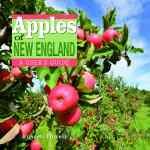THERE MAY NOT BE a better all-purpose apple than Cortland. It has long been known for its excellence in pies. It is recommended for salads, since its white flesh is slow to brown.
Cortland lends a heady aroma to cider. It is an outstanding fresh eating apple as well.
Cortland exhibits the best qualities of its parents, McIntosh and Ben Davis. The latter is a southern heirloom dating back to the early 1800s. Ben Davis stores well but has mild flavor, and it is not widely grown in New England.
But Ben Davis lends Cortland some noteworthy attributes, including its green and yellow striping and large size, both of which distinguish it from McIntosh. The Mac parent gives Cortland ample juice and a sweet-tart flavor, a tad milder than McIntosh. Cortland’s texture, in contrast, is a little firmer than McIntosh.
Cortland stores well, but it does develop a waxy skin over time. The coating is the apple’s way to retain moisture, and it is harmless. It can be eaten or easily rubbed off.

Cortland is one of the best cooking apples, alone in apple pie or complementing softer varieties like McIntosh.
Its large size works to Cortland’s advantage in cooking, since it holds its shape, and fewer apples are needed to make a pie. But the biggest Cortlands can be too much for one person to handle, literally and figuratively. Still, it is delicious eaten fresh, with plenty of juice and apple flavor, and it comes in all sizes.
Cortland was developed at the New York State Agricultural Experiment Station in Geneva in 1898.
* * *
The classic Waldorf Salad is simple but delicious, especially with Cortlands. Mix together:
1 c Cortland apples, diced
1 c celery, diced
1/2 c walnut or pecan meats
1/2 c mayonnaise
You can substitute yogurt for mayonnaise for a slightly healthier version.
* * *
THE 6TH ANNUAL Great New England Apple Pie Contest will be held this Saturday, October 17, at 11 a.m., at Wachusett Mountain in Princeton, Massachusetts. Bar Lois Weeks, executive director of the New England Apple Association, and Senior Writer Russell Steven Powell will both be judges at the event.
The contest is part of the 32nd annual AppleFest, both Saturday and Sunday from 10 a.m. to 5 p.m.
* * *
 America’s Apple (Brook Hollow Press), a book by Russell Steven Powell, senior writer, and Bar Lois Weeks, executive director of the New England Apple Association, tells a rich and detailed story about apple growing in America, from horticulture to history to culinary uses. Powell writes about the best ways to eat, drink, and cook with apples. He describes the orchard’s beauty and introduces readers to some of the family farms where apples are grown today, many of them spanning generations.
America’s Apple (Brook Hollow Press), a book by Russell Steven Powell, senior writer, and Bar Lois Weeks, executive director of the New England Apple Association, tells a rich and detailed story about apple growing in America, from horticulture to history to culinary uses. Powell writes about the best ways to eat, drink, and cook with apples. He describes the orchard’s beauty and introduces readers to some of the family farms where apples are grown today, many of them spanning generations.
America’s Apple looks at how America’s orchards are changing as a result of the trend toward intensive planting and the trademarking of new varieties, and what that means to consumers. Powell also writes about the fragile underpinnings of modern agriculture: the honeybees needed to pollinate the crop and the labor required to pick it, plus new and exotic pests and increasingly volatile weather.
 Powell and Weeks explore the history of apple growing in the region Apples of New England (Countryman Press), an indispensable resource for anyone searching for apples in New England orchards, farm stands, or grocery stores — or trying to identify an apple tree in their own backyard.
Powell and Weeks explore the history of apple growing in the region Apples of New England (Countryman Press), an indispensable resource for anyone searching for apples in New England orchards, farm stands, or grocery stores — or trying to identify an apple tree in their own backyard.
The book contains color photographs by Weeks and descriptions of more than 200 apples discovered, grown, or sold in New England, accompanied by notes about flavor and texture, history, ripening time, storage quality, and best use. Apples of New England offers practical advice about rare heirlooms and newly discovered apples.
Apples of New England includes chapters on the rich tradition of apple growing in New England, and on the “fathers” of American apples, Massachusetts natives John Chapman (“Johnny Appleseed”) and Henry David Thoreau. Apples of New England presents the apple in all its splendor: as a biological wonder, as a super food, as a work of art, and as a cultural icon.
Apples of New England and America’s Apple are available in hardcover at fine bookstores and orchards and online. America’s Apple is also available in paperback.
